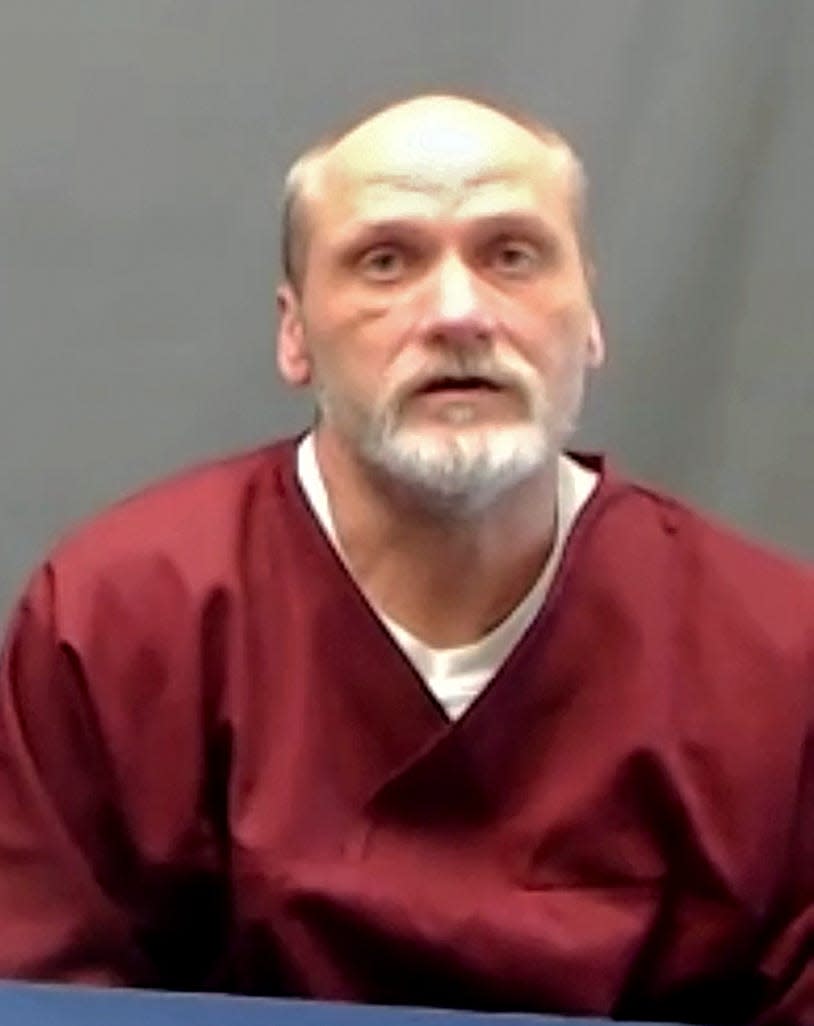Oklahoma death row inmate James Coddington denied clemency
- Oops!Something went wrong.Please try again later.
For the second time, Gov. Kevin Stitt has refused clemency to a death row inmate.
The decision means James Coddington, 50, will be executed by lethal injection as scheduled at 10 a.m. Thursday at the Oklahoma State Penitentiary in McAlester. A federal appeals court already has denied his request for a stay.
"I have thoroughly reviewed the arguments and evidence presented in this case and have determined that clemency should be denied," the governor stated Wednesday in an executive order.
The denial came despite the inmate's strong expressions of remorse and statements of support from surprising sources. “James is loved by many people and he has touched the hearts of many. He is a good man," his attorney, Emma Rolls, said after the decision.

The Oklahoma Pardon and Parole Board voted 3-2 on Aug. 3 to recommend clemency after Coddington made an emotional apology and spoke about how he has changed.
"I have tried to be the best person I can be since the day that that happened," he said. "I'm clean. I know God. I'm not, I'm not a vicious murderer."
Coddington is facing execution for murdering Albert Troy Hale, a friend and co-worker, during a cocaine binge and robbery spree in 1997.
He went to Hale's house in Choctaw to borrow $50 for cocaine after robbing a convenience store, according to his own statements in the case. Hale, 73, turned him down and told him to leave.
Coddington then beat Hale with a claw hammer, took $525, left and robbed five more convenience stores. He confessed after he was arrested by police outside his south Oklahoma City apartment.
25 Oklahoma inmates scheduled to be executed by the end of 2024
Coddington was the first of 25 inmates scheduled for execution after a federal judge in June rejected their complaints about a sedative used in the lethal injection process. The executions are set through the end of 2024.
He had sought a stay of his execution at the 10th U.S. Circuit Court of Appeals in Denver. He argued his attorneys need access to him in his final two hours in case something goes wrong so they can seek judicial intervention.
The appeals court ruled against him on Saturday.
Among those calling for clemency was Justin Jones, a former director at the Oklahoma Department of Corrections.
More:Fatih leaders call for prayer to end death penalty in Oklahoma
"The maturity, mentorship, hard work and calm presence Coddington’s prison records depict are no small matter," Jones wrote in a guest column for The Oklahoman. "Despite the best efforts of our dedicated correctional workers, Oklahoma’s prisons can be dangerous and violent. By all accounts, Coddington is a calming force."
Former House Speaker Kris Steele told the governor in a letter that "I hope that when you look at all the information before you, you will consider God's call to extend mercy to the redeemed."
One of his robbery victims, Trisha Allen, said in a sworn statement sent to Stitt that she spoke with Coddington by phone after learning his execution had been set. She said he apologized for his actions, and she forgave him.
"I believe if James was given the opportunity to live out his life behind bars, he could be a good influence on other prisoners. He is capable of changing others' lives," Allen said. "I believe in the power of redemption."
In a presentation to the parole board, Coddington's attorney, Rolls, described his childhood as tortured and traumatic. She said he was mainlining cocaine at age 15 and given methamphetamine by his own mother.
She also talked at length about his remorse, saying he has gone through a transformation since he killed at the age of 24.
Stitt previously granted clemency to death row inmate Julius Jones
The governor can only grant clemency if the parole board recommends it.
Coddington's sentence would have been commuted to life in prison without the possibility of parole, if the governor had granted clemency.
Stitt last year commuted the death sentence of Julius Jones, less than four hours before the inmate's execution was to begin.
Julius Jones became the most high-profile inmate on Oklahoma's death row after ABC in 2018 aired a documentary series, "The Last Defense," about his innocence claim. Millions signed a petition in his support, and hundreds participated in freedom marches.
He was set for execution after being kicked out of the lawsuit over the lethal injection process. At his clemency hearing, the board recommended 3-1 that his death sentence be reduced to life in prison. The governor instead commuted it to life in prison without the possibility of parole.
The governor in December refused to commute the sentence of death row inmate Bigler Jobe "Bud" Stouffer II, who was never part of the lawsuit.
Stouffer was executed Dec. 9 for a fatal shooting in 1985. The parole board had voted 3-2 to recommend clemency for him.
This article originally appeared on Oklahoman: Oklahoma death row inmate James Coddington denied clemency

